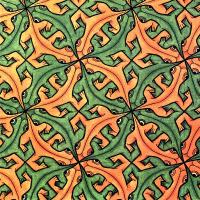Sporočila: 41
Jezik: English
ShannonCC (Prikaži profil) 15. november 2013 14:39:01
erinja (Prikaži profil) 15. november 2013 15:01:18
goli (Prikaži profil) 15. november 2013 15:02:27
Homeschool = hejmlernejo = hejm (root of the word hejmo - home) + lern (root in lerni — to learn) + ej (suffix meaning a place for) + o (ending of a noun).
So thus to homeschool is hejmlerni, homeschooler is hejmlernulo and homeschooling is hejmlernado.
If you don't a word in esperanto, but you know the other words you could've explained that one with, do it. Actually in English we also make words with suffixes and prefixes, like the word enlighten is made of light by adding the prefix en and the suffix en. In esperanto you are just more free with word-creating since there no linguistic stereotypes that tells you that something sounds awkward and something doesn't. Learn how to make new words in esperanto and you will enjoy creating new words.
ShannonCC (Prikaži profil) 15. november 2013 15:04:29
 I hadn't learned "hejm" yet so had to look it up.
I hadn't learned "hejm" yet so had to look it up. Hejmlernado makes sense for the concept. Thanks

NJ Esperantist (Prikaži profil) 15. november 2013 16:00:44
erinja:I'd say "hejmlernanto", home learner, for a homeschooler. And then "hejmlernejo" for the place, such as it is, and hejmlernado, for homeschooling as a concept.And one who does the schoolong at home would be a "hejminstruanto", correct?
jismith1989 (Prikaži profil) 15. november 2013 16:05:05
NJ Esperantist:Hejminstruisto, I'd have thought.erinja:I'd say "hejmlernanto", home learner, for a homeschooler. And then "hejmlernejo" for the place, such as it is, and hejmlernado, for homeschooling as a concept.And one who does the schoolong at home would be a "hejminstruanto", correct?

erinja (Prikaži profil) 15. november 2013 16:10:05
ShannonCC (Prikaži profil) 15. november 2013 16:43:29
erinja (Prikaži profil) 15. november 2013 16:53:07
I know that if you teach home school, it is certainly something that is very serious and it eats up a big portion of your life. But it's a sort of limited-time thing, once your kid graduates you don't expect to continue with it, so in this case I'd prefer the -ant- suffix (unless you did expect to continue with home teaching after your kid graduates?)
To me it's analogous to a child in school, who is a 'lernanto' and not a 'lernisto'. It's a limited-time thing, it's not a profession or a hobby. A lernisto would be someone whose profession or very serious hobby it is to learn.
jismith1989 (Prikaži profil) 15. november 2013 17:04:10
erinja:In this case I'd actually say hejminstruanto, unless the person does it professionally. If it's just a normal parent who does it, I think -ant- is maybe more appropriate.Okay, makes sense. I think you could use either and be understood though.
After all, professions and hobbies are often time-limited too (especially in our modern service-centric economies). You may, for example, be a kuiristo at McDonalds, but only while you're also studying at college/university (and you may not be very serious about it all, but just doing it for the money), which, to me at least, seems analogous to teaching your child but only until he reaches 18. I can also see the logic in using the participle-derived form though, I just think it's hard to make a clear distinction. To me (and, admittedly, my understanding of Esperanto grammar comes mainly from Latin grammar, which I happen to have studied more), the participle-derived form would imply something very time-limited, something that you're doing at this present moment and may or may not do ever again (so la kuiranto to me seems equivalent to saying, more long-windedly, 'the person who is [currently] cooking', i.e. not necessarily 'the cook' or even 'the person who likes cooking', which would presumably be la kuiremulo)... anyway, that's just my impression, and may not be in line with usage or even the grammar books, so feel free to correct me if I'm wrong.
So, in short, I think someone who homeschools their child would be likely to define themselves by that fact in the same way that a lawyer would define themselves by their work in the office/court, i.e. it's their primary occupation. So in that sense, I suppose what word you use is even be a bit ideological: you're making a statement about how you see yourself and what you do in relation to others and what they do! In other words, a so-called 'housewife' might use an -isto word to make the point that what she does is of equal value with going out to work (rather than the old-fashioned sounding dictionary word dommastrino). Of course, I'm not saying whether I agree with that or not (and I'm not a housewife in any case!), but it does show how the language we use can be political.
I can see why you'd use lernanto (or, at least, not lernisto) for a kid at school though -- because they have no choice in the matter, they have to be there whether they like it or not!



